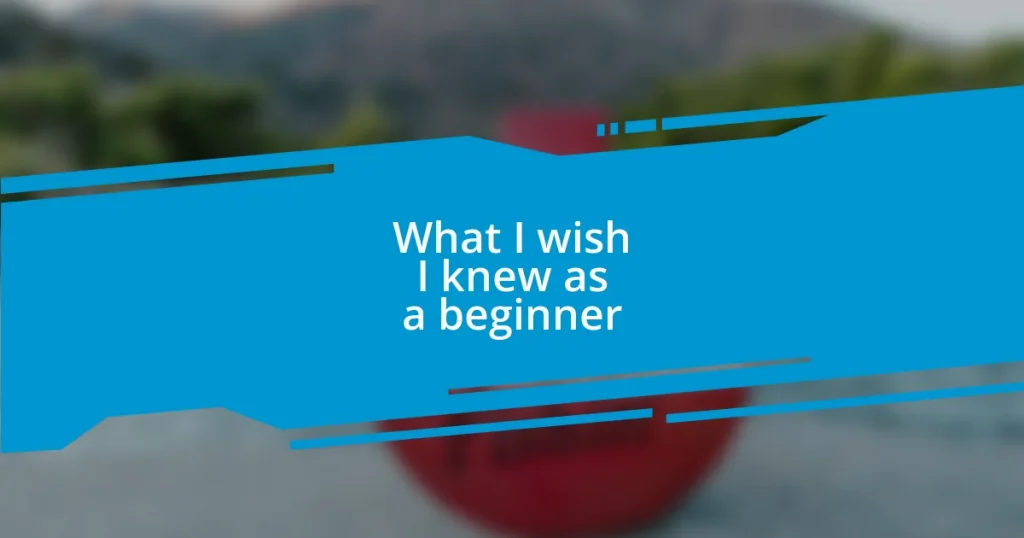Key takeaways:
- Time management, adaptability, and networking are essential skills for beginners that significantly enhance their journey.
- Common mistakes to avoid include rushing projects, ignoring feedback, and neglecting self-care, each leading to various negative consequences.
- Reflecting on one’s journey fosters growth, helping to appreciate progress and set meaningful future intentions.
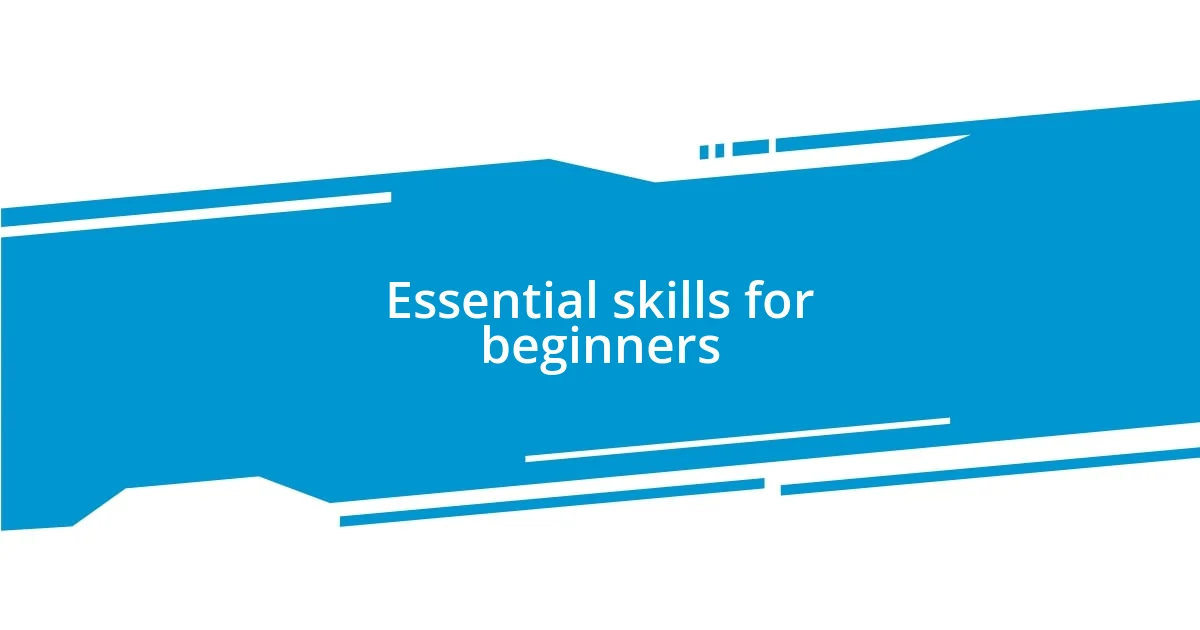
Essential skills for beginners
When I first started, I underestimated the power of time management. I recall feeling overwhelmed, juggling tasks without a clear plan. It was only when I began to prioritize my responsibilities that I felt a weight lift; suddenly, everything seemed more manageable.
Another skill that truly transformed my experience was adaptability. I remember a moment when a project I had meticulously planned went awry. Instead of panicking, I quickly pivoted and found an alternative solution, which taught me that flexibility often opens doors to unexpected opportunities. Have you ever found yourself stuck, only to realize that a change in perspective can lead to a much better outcome?
Lastly, I cannot stress enough the importance of building a network. When I reached out to others in my field, I discovered a wealth of knowledge and support. I still remember my first coffee meeting with a mentor who shared invaluable insights and advice that I wouldn’t have accessed otherwise. It’s amazing how one connection can propel you forward in your journey!
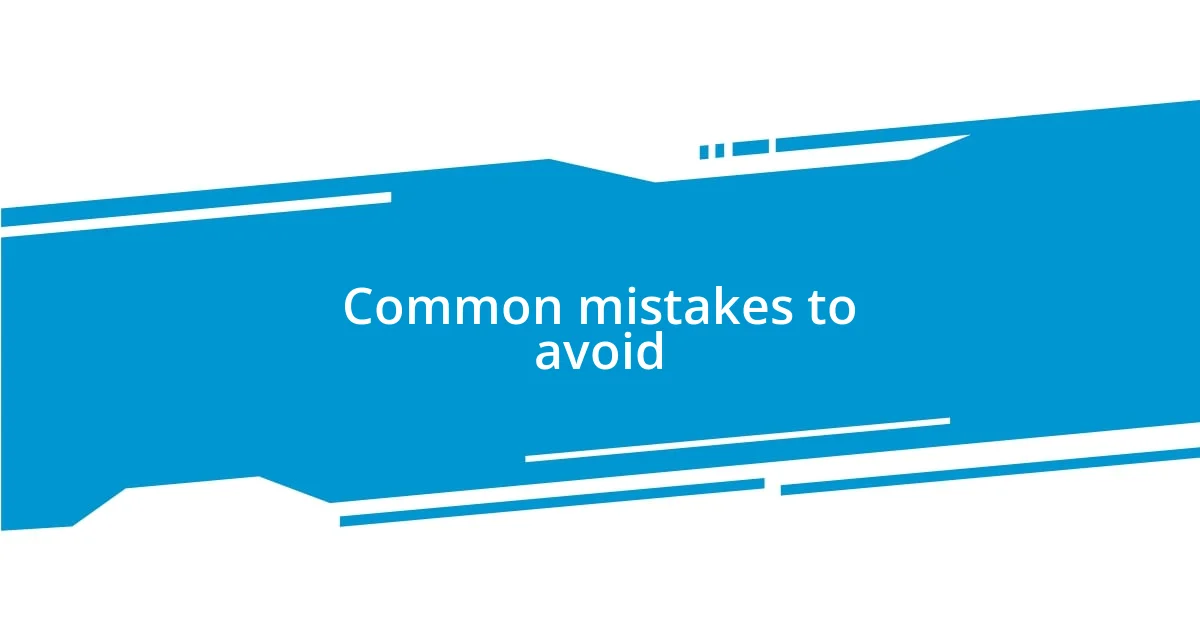
Common mistakes to avoid
One common mistake I see beginners make is rushing into projects without adequate research. I remember diving headfirst into a task, only to realize later that I lacked crucial background knowledge. That frustrating experience taught me the value of thorough preparation; taking time to understand the context can save you countless hours down the line.
Another pitfall is ignoring feedback. I once dismissed criticism from a colleague, thinking I knew better. It wasn’t until I faced a setback that I learned the power of constructive feedback. Embracing diverse perspectives can significantly enhance your work and help you grow quicker than you might expect.
Finally, many beginners overlook the importance of self-care. I learned this the hard way after burning out from constant hustle. Making time for rest and rejuvenation not only improves productivity but also sharpens your focus. So, don’t make the mistake of thinking you can grind through; sometimes, stepping away is the best strategy to move forward.
| Common Mistakes | Consequences |
|---|---|
| Rushing Projects | Lack of Preparation |
| Ignoring Feedback | Stunted Growth |
| Neglecting Self-Care | Burnout and Decreased Productivity |
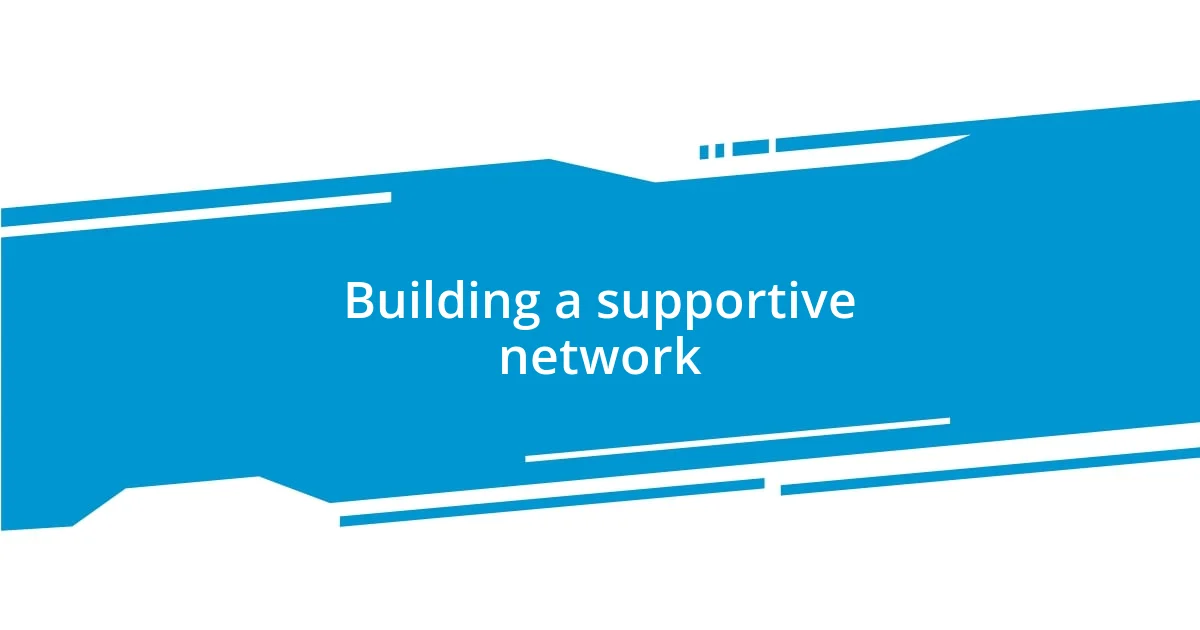
Building a supportive network
Building a supportive network can feel daunting at first, but I assure you, it’s one of the most rewarding experiences. I vividly recall attending my first industry event, feeling a mix of excitement and anxiety. That day, I mustered the courage to introduce myself to several people; the connections I made turned into friendships and valuable partnerships. It was a pivotal moment that reminded me just how essential it is to surround yourself with like-minded individuals.
To effectively build your network, consider these strategies:
- Attend Workshops and Events: Engaging in gatherings related to your field can help you meet peers and mentors.
- Join Online Communities: Platforms like LinkedIn and industry-specific forums are excellent for connecting with others beyond geographic limitations.
- Reach Out to Mentors: Don’t hesitate to contact someone you admire. Many are receptive to sharing their experiences and guidance.
- Volunteer for Projects: Participating in collaborative work allows you to showcase your skills while meeting others in your field.
- Follow Up: After encounters, a simple message to express appreciation can cement your new connections.
Every step I took to build my network has brought me knowledge and support I didn’t know I needed, reinforcing the idea that we thrive when we help one another. I still smile at the memories of those early conversations, realizing how they set the stage for future successes.
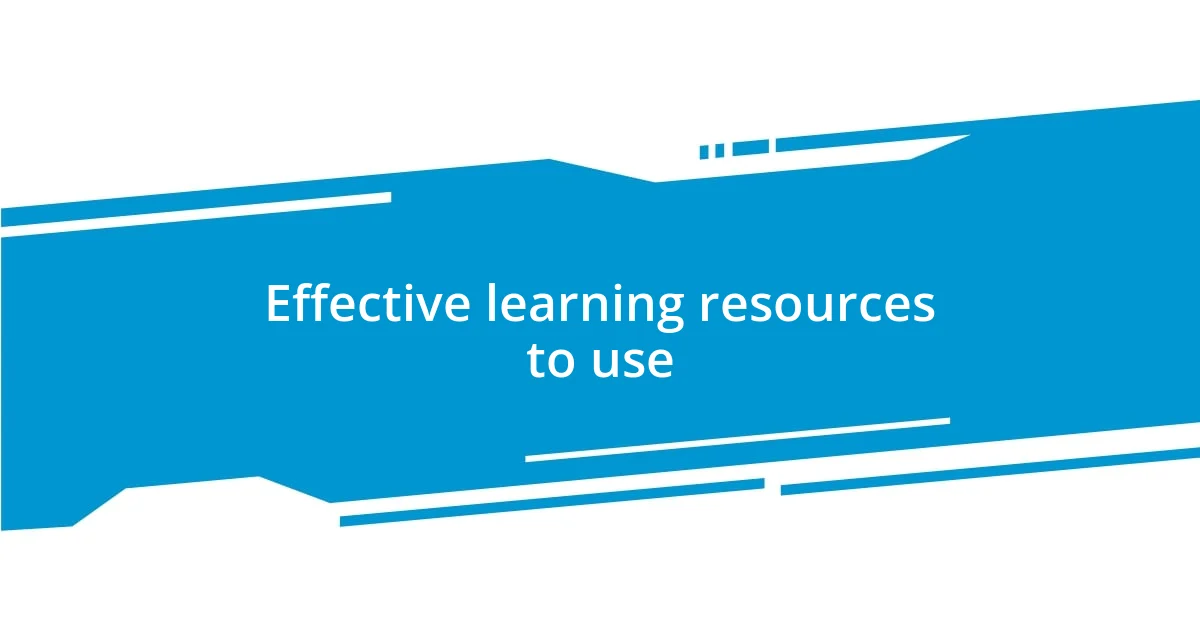
Effective learning resources to use
When it comes to effective learning resources, I’ve found that mixing various types often yields the best results. For instance, I once stumbled across an online course that blew my mind with its hands-on approach. It wasn’t just theory; it included interactive exercises that made the concepts stick. Have you ever experienced that “aha!” moment while learning? It’s a game changer.
Books remain invaluable, especially when you find authors who speak to you. I vividly remember diving into a particular book that resonated deeply with my struggles as a beginner. The author’s personal anecdotes made complex ideas relatable, and I felt a sense of camaraderie. I truly believe that reading not only expands your knowledge but also gives you the confidence to tackle new challenges.
Podcasts and YouTube channels are fantastic for on-the-go learning. I often listen to industry leaders while commuting, and I can’t express how inspiring and informative those moments have been. Just last week, I listened to a podcast episode that offered actionable insights I applied immediately. Have you tried listening to a podcast while you’re jogging or cooking? It can make even mundane tasks feel productive!
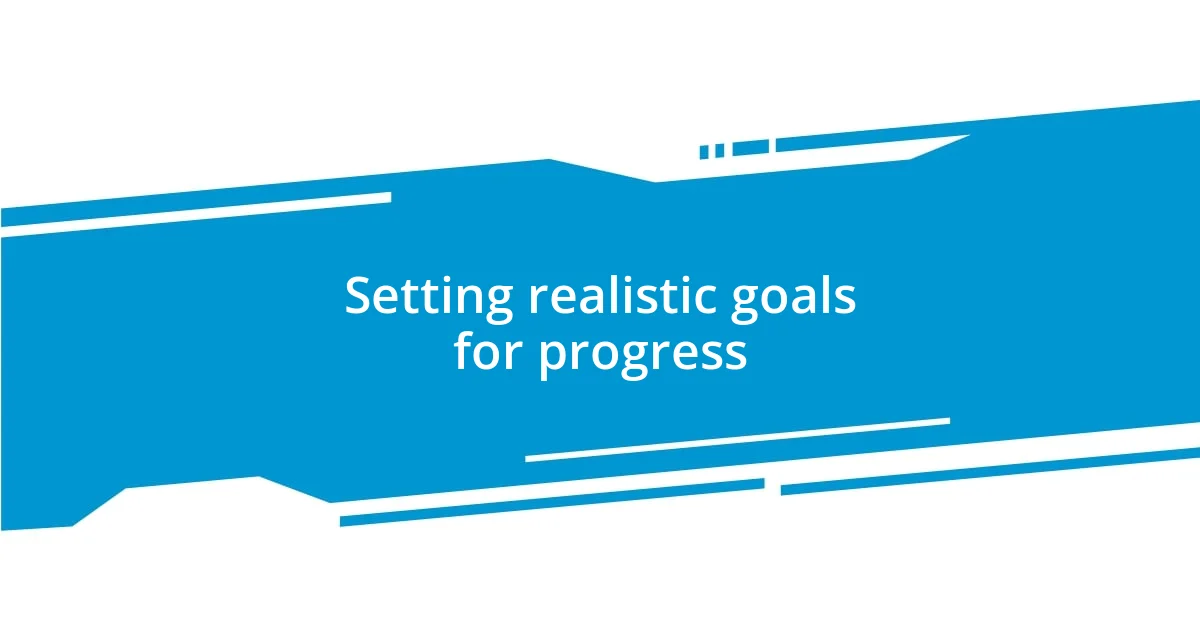
Setting realistic goals for progress
Setting realistic goals for progress is essential for maintaining motivation. I remember when I first started out; I aimed too high too quickly and faced disappointment when I didn’t achieve those lofty expectations. This kind of situation can be disheartening, but by breaking down my goals into smaller, more manageable steps, I found I was able to celebrate small victories along the way. Have you experienced that rewarding feeling of ticking off a goal, no matter how small? It truly sparks motivation.
One effective way to set these realistic goals is through the SMART criteria: Specific, Measurable, Achievable, Relevant, and Time-bound. As I revisited my goals through this lens, I discovered that I could envision a clearer path forward. For example, rather than saying, “I want to improve my skills,” I shifted to “I will complete one online course in three months.” That specificity made it easier to stay focused and track my progress.
Reflecting on my experience, I cannot stress enough how vital it is to adjust goals as you advance. There were moments when I had to recalibrate, realizing my initial objectives no longer aligned with my growth. It’s okay to pivot; it means you’re learning and evolving. Have you ever felt the need to change course? Embracing flexibility not only helps you stay grounded but also enriches your journey!
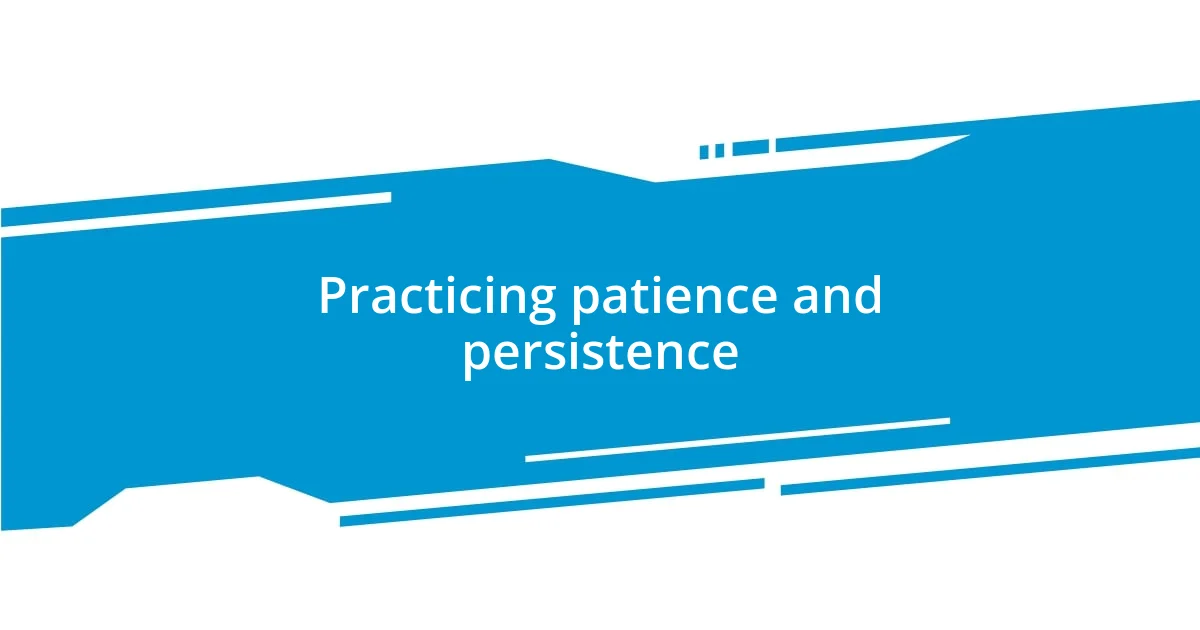
Practicing patience and persistence
Practicing patience and persistence is essential when you’re starting out on any new journey. I remember when I was learning a new skill; I hit many bumps along the way that tested my resolve. There were days when frustration crept in, and I thought about giving up. But I learned that slow, consistent effort often leads to mastery more than any hurried rush ever could.
One vivid moment comes to mind when I struggled with a challenging project. I poured hours into it, only to face setbacks that made me question my abilities. Instead of getting discouraged, I decided to take a step back and approach it with renewed focus and a fresh perspective. That experience taught me the power of persistence. Each time I faced a roadblock, it felt like an opportunity to learn rather than a failure. Have you ever experienced a setback that turned into a valuable lesson? It can truly reshape how you view challenges.
As I reflect on my journey, I realize that cultivating patience and persistence is like planting seeds—you may not see immediate results, but with time and care, growth will happen. I often think about moments when I felt like quitting, but instead, I chose to keep pushing forward. It was during those tough times that I developed resilience, and now I approach new challenges with a mindset rooted in both patience and commitment. What if we embraced each hurdle as a stepping stone rather than an obstacle? That shift in perspective can be transformative.
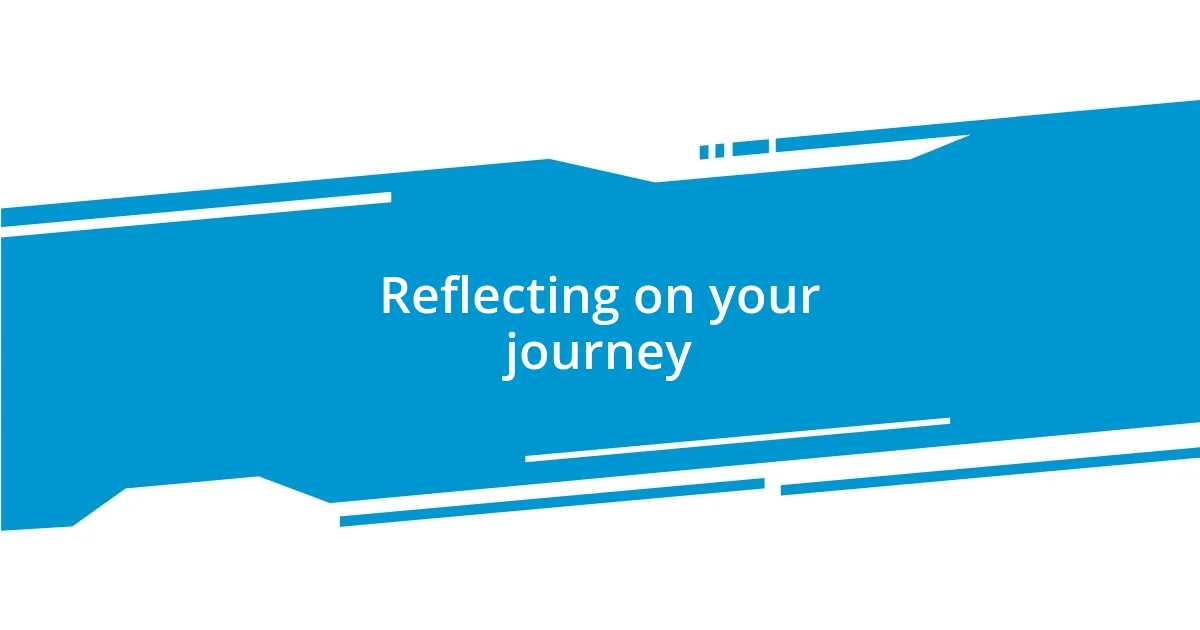
Reflecting on your journey
Reflecting on my journey has been a powerful catalyst for growth. I look back on earlier days, when every misstep felt monumental, and the weight of self-doubt often threatened to overshadow my achievements. I remember a particular instance when I spent weeks practicing a new technique, only to find myself frustrated by a lack of progress. It wasn’t until I took a moment to reflect on that experience that I recognized the invaluable lessons hiding within my struggles. Have you ever had a moment where you realized that challenges were actually shaping you into a stronger version of yourself?
As I navigated through various stages of my learning process, I found that taking time to reflect helped me appreciate how far I had come. Sometimes I would jot down my thoughts in a journal, capturing both my triumphs and failures. Revisiting those entries brought a rush of gratitude and often reminded me of the resilience I built along the way. It’s interesting, isn’t it? When you pause and look back, those small victories start to shine brighter, illuminating the path you’ve traveled.
Digging deeper into reflection, I discovered that it wasn’t just about looking back—it was about envisioning my future too. Thinking about where I started allowed me to set more meaningful intentions moving forward. I remember a moment of clarity when I understood that each decision I made was part of a much larger story. That realization empowered me to take ownership of my learning process. So, what will your journey look like as you incorporate reflection into your routine? It’s an exciting prospect, isn’t it?











